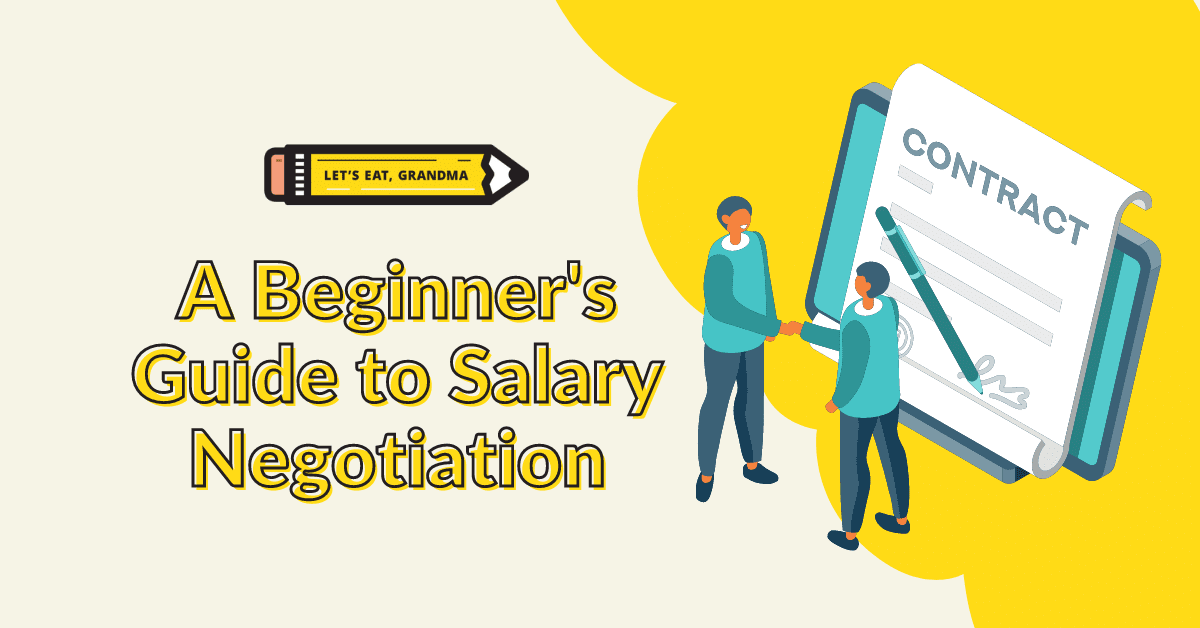After the Offer: A Beginner’s Guide to Negotiating Your Salary

Negotiating your salary after you receive a job offer can feel intimidating, especially when you’re just starting out in your career. However, the more prepared you are for the conversation, the easier it will be. Here’s what you need to know to have a productive conversation and get what you’re worth.
By: Katelyn Skye Bennett | Contributor for Let’s Eat, Grandma
One lesson I wish I learned earlier in life is that even new graduates can negotiate their starting salary after they receive a job offer. Had I been more aware of my worth to the companies that sent me offer letters and strategic with my expenses, I could have set myself up for more financial success.
As a degree holder, employers are likely to value you more than you might realize. And as much as it seems like entry level jobs require intermediate work history, employers understand that people don’t usually graduate with 5+ years of experience under their belt.
Tired of not landing interviews?
Get our free 3-step guide to writing better resume bullet points, featuring 70 ideas for metrics you can use!
Having come from a learning environment, recent graduates are also valuable in that they tend to have energy and are conditioned to learn quickly.
So how do you know if you should accept the starting salary you’ve been offered?
Setting Your Own Standard

Building an honest budget for yourself will help you establish a baseline salary. Photo by Kelly Sikkema on Unsplash
First, build your budget — student loans, rent and utilities, transit, food, family obligations, an emergency fund, and extra expenses — and establish your absolute minimum salary. You now know what you need to survive and can set the range for your desired salary well above this bar.
Keep in mind that your starting salary sets the foundation for your future pay, influences cumulative gains, and even impacts benefits like your 401K.
Say your initial offer is $57,000, and your company has budgeted to give you a 2.7% raise each year. After five years, you’ll be making $65,121.90. But what if you negotiate your starting pay to be $65,000 at that same company? After five years, you’ll instead be making $74,261.82.
As someone who works in social services in a large city, I started off a previous job making $35,000 with a couple years of experience. I didn’t negotiate for fear of losing the offer, but I later found out that my nonprofit didn’t offer raises, so I had no financial growth in my future.
One of my friends took a job at a different agency and mentioned, “Once you hit $40K, you’ll never go back.” At that point, if any prospective employer offered me something less, I could pull out my pay history to back up why I needed that number in the 40,000s at the least.
Don’t Doubt Yourself
Even recent college graduates can and should consider negotiating a job offer salary, albeit carefully.
Consider your experience when negotiating, including internships, since unpaid work is still work! Unique hard skills like multilingual fluency or additional certifications beyond your degree can also support your ask for a higher salary.
While it’s wise to be reasonable, don’t limit yourself too much. If the employer offers you $18 per hour, they’re not going to flex up to double that, but they might give you a couple dollars more based on their budget, local standards, or a particular asset you’re bringing to the table.
You already know they want you because they’ve offered you the job, so be brave. And for all my ladies out there who have been socialized to accept what they’re given, you deserve to be paid equitably as well.
Tools to Help You Know Your Worth

Thorough research on the salary landscape in your field will give you confidence that you’re asking for what you’re worth. Photo by Amy Hirschi on Unsplash
While other experts discuss tips for negotiating your salary, like asking for more than what you actually expect to receive, here are some ways to determine if the job offer matches what you’re worth.
When offered a position, compare the offer to the average salary of other jobs by the same title or field in your location. Many job search platforms have features to assist with this, including Glassdoor, Monster, LinkedIn, and Indeed.
For example, the average base salary for a recruiter in Chicago is $57,598 per year, 18% higher than the national average according to Indeed. Monster supports this, saying the median recruiter salary in Chicago is $57,073.
LinkedIn cites $42,000 as the base salary for less than a year of recruiting experience nationally but $50,000 as the base salary for one to five years. (Note that base salary does not include additional compensation like bonuses.) Counting related experience from your undergraduate years to bring you into that one-to-five-year range can support your use of this second number as you negotiate, and local statistics may boost that number further due to the cost of living.
Glassdoor works with a much larger pool of data, increasing the accuracy of its numbers as you research. It offers additional filters so you can search by sub-industry, company size, and amount of experience. Glassdoor can also help you analyze your offer to see if it stacks up.
So, if you’re offered a recruiter position for $45K but live in the expensive Windy City and need a bit more, comparing data from these sources can give you leverage to negotiate upward.
Even if you’re fresh out of college and haven’t had extensive work experience to support your negotiations, the salary data from your region can still support your ask.
Get What You’re Worth
If you feel that your experience and skills deserve a higher salary than what you’ve been offered, don’t be afraid to ask for what you’re worth. Remember to do your research, be tactful, and you might just get a better offer. Happy negotiating!
Ready for more job search help?
Sign up for a free Senior Writer Resume Critique to see what's holding you back from landing interviews. One of our top professional resume writers will give you personalized feedback on the top 3 items you can improve based on our expert practices!
